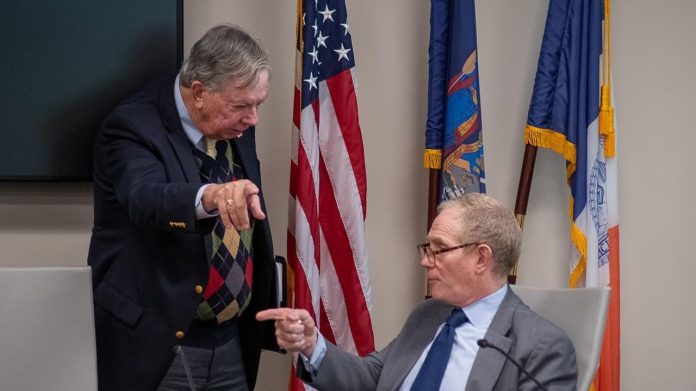The Long Island Rail Road’s president said Wednesday that more workers should expect to be fired for their involvement in an alleged employee identification card counterfeiting ring after an MTA Board member said several implicated workers “have skated.”
James O’Donnell, the Orange County representative on the Metropolitan Transportation Authority Board and a former MTA Police chief, expressed frustration that most of the 36 workers implicated in the MTA inspector general’s latest investigation remain employed by the railroad and only one has been fired.
“This is hundreds and hundreds of thousands of dollars that was stolen right under our noses,” O’Donnell said at a railroad committee meeting in Manhattan.
“These people will continue to reap the benefits of their behavior with their pensions, and, to me, that is unconscionable,” O’Donnell said.
WHAT NEWSDAY FOUND
- An MTA Board member expressed frustration that several workers implicated in an alleged employee card counterfeiting ring “have skated” and asked for a briefing from the agency’s inspector general.
- One of the 36 workers implicated was fired, and a dozen others resigned or retired, according to records obtained by Newsday. Eighteen employees still working at the LIRR have accepted demotions or unpaid suspensions, and another five face possible termination.
- MTA chairman and CEO Janno Lieber said he’d arrange a briefing of the MTA Board by the Cort’s office, but suggested it may not be open to the public
Responding to O’Donnell’s remarks, LIRR president Rob Free said while only one employee has been fired so far, others are in the middle of disciplinary proceedings that could also result in their termination.
Half of the 36 accused LIRR employees still work at the railroad and have accepted unpaid suspensions of four to nine months, and, in some cases, demotions, according to records obtained by Newsday. Five others face more disciplinary proceedings that could lead to termination.
A dozen other workers, Free said, resigned or retired, knowing the fate that could await them. Several of those workers forfeited accrued earnings totaling more than $100,000, LIRR officials have said.

MTA Board member James O’Donnell. Credit: MTA
“Whether we were able to charge them and fire them, or they left on their own will, they knew it was time to go, because they knew they were facing termination,” Free said.
Last month, MTA Inspector General Daniel Cort released the findings of a three-year investigation into an employee badge counterfeiting scheme at the LIRR’s maintenance of equipment department.
According to investigators, LIRR employees working out of facilities in Ronkonkoma, the Richmond Hill section of Queens and Manhattan’s West Side Yard, used magnetic swipe card reading devices and blank cards purchased on Amazon to run off copies of employee badges and sold them to co-workers for $5 to $40.
Employees used the cards to cover for their co-workers when they ran late, left early or didn’t show up altogether, investigators said.
The LIRR and investigators have said they cannot determine the full amount accused employees were paid for wages they didn’t earn, in part because the time clocks were not monitored by security cameras, and could not distinguish a real card from a fake one.
Car inspector Richard Bovell last week became the first implicated worker to be fired. Cort’s office had evidence of Bovell working a second job while on the clock for the LIRR, according to the report.
Bovell admitted to investigators owning and using a cloned card, but denied using it to cover up for his moonlighting at a private bus company.
“As we have more concrete evidence, we’re going for more severe punishment,” Free said. “We are as outraged and disgusted with the behavior of these 36 employees as board member O’Donnell is.”
O’Donnell previously criticized Suffolk County District Attorney Ray Tierney for declining to bring criminal charges against any of the workers. Tierney has said his office investigated the case, which was referred to him by Cort’s office, but ultimately decided there was insufficient evidence. The Manhattan and Queens district attorney’s offices have not commented on the case.
Several of the accused workers still employed by the railroad are among its highest overtime earners, noted O’Donnell, who expressed frustration with being kept in the dark about the details of the investigation.
“I’m tired of just reading about this in the newspaper secondhand,” O’Donnell said, holding a printed copy of a recent Newsday story on the case.
MTA chairman and CEO Janno Lieber said he’d arrange a briefing of the MTA Board by the Cort’s office, but suggested it may not be open to the public “if it involves investigations that are underway or disciplinary processes that are confidential.”
MTA inspector general spokesman Eric Lenkowitz said in a statement the office is aware of the request for a briefing of board members and had no further comment.
In an interview, MTA Board member Marc Herbst, who chairs the MTA Board’s railroad committee, said he understood O’Donnell’s frustration over the matter, but noted the case is wrapped up in “due process” and “confidentiality.”
“So a lot of the stuff that is going on, we really can’t comment on or talk about. But that doesn’t stop the outrage,” said Herbst, who believes the railroad is “aggressively going after” the accused workers.
“You had 36 bad apples, and a third of them are already gone,” Herbst said.








